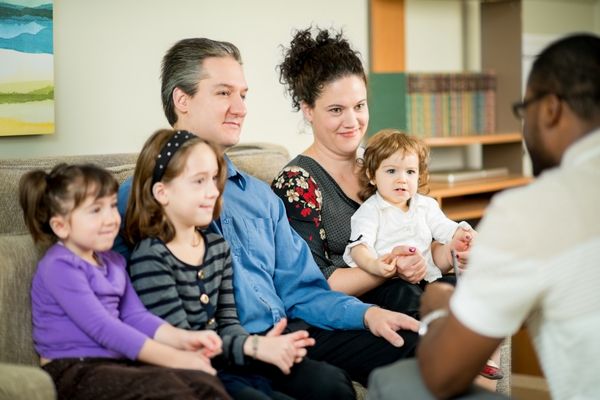What Is A Common Problem In A Court-Ordered Family Therapy?
A master’s in marriage and family therapy provides advanced training in supporting individuals and families through emotional and relational challenges. The program develops core skills in assessment, communication, and therapeutic techniques, while offering the academic foundation necessary to work in specialized settings, including court-ordered family therapy.
While every client presents a unique background, marriage and family therapists often notice consistent patterns in the concerns brought forward. Being aware of these patterns allows therapists to respond with clarity and confidence in each session. This insight helps create a structured yet personalized approach for every client encounter.

Top Issues That Lead People to Marriage and Family Therapy
Preparing for Marriage: Relationship Education
Couples preparing for marriage often seek professional guidance to strengthen their relationship before making a lifelong commitment. Whether they’ve been together for years or are newly engaged, many recognize the value of premarital sessions. While some pursue this through religious institutions, many turn directly to therapists for support. These sessions offer a proactive space to address concerns and improve communication early on. As a trained professional, you provide essential skills that help couples navigate challenges with confidence and mutual respect. This early intervention creates a positive emotional foundation that supports long-term partnership growth.
Professionals in relationship counseling play a crucial role in preparing individuals and couples for long-term relational success. They provide guidance on navigating expectations, setting boundaries, and aligning values to prevent future challenges. By teaching effective communication and conflict resolution skills, they help build trust and emotional resilience. These foundational approaches are applicable across various counseling contexts, including mandated or court-involved services, ensuring clients develop healthy and intentional relationship dynamics.
Developing Personalized Treatment Plans
Not every family enters therapy because of a shared issue affecting everyone at once. Often, a single member is dealing with challenges like addiction, gambling, depression, or other mental health concerns. These individual struggles can create stress throughout the entire household, disrupting communication and emotional stability. Therapy becomes a space where everyone involved can express their thoughts and feelings without fear of judgment. This supportive environment encourages empathy and unity within the family dynamic.
Relationship and family counseling professionals are responsible for developing tailored intervention plans that address both individual concerns and the broader dynamics of the family system. These customized strategies are essential for fostering meaningful progress and long-term outcomes. Even within more rigid frameworks, such as mandated therapy settings, adapting approaches to fit each client’s unique circumstances remains critical. Personalized planning helps ensure that therapeutic goals align with the needs of all parties involved, promoting overall well-being and sustainable change.
Supporting Children with School Challenges
When a child struggles in school, it doesn’t mean they lack intelligence or good behavior. School difficulties often stem from issues such as peer conflict, stress at home, or learning disorders that require expert attention. These challenges can impact not only academic performance but also emotional well-being. Professional therapy provides a structured, confidential space to explore these issues thoroughly. Addressing them early with qualified guidance leads to stronger long-term outcomes for the child.
At our practice, we assess each child’s situation with care and precision. We collaborate closely with families to develop targeted support plans that reflect the child’s emotional and educational needs. Even in sensitive cases like court-ordered family therapy, our clinicians use proven methods to guide families toward stability. Our commitment is to help children regain focus, confidence, and a healthy school-life balance through professional, evidence-based care.
Empowerment Through Life Coaching
Not every client seeks therapy due to trauma, addiction, or crisis. Many simply feel uncertain about their next steps in life. Life coaching offers a focused, goal-oriented process that helps individuals clarify what they truly want from their careers, relationships, and personal growth. These sessions create structure and accountability, giving clients the clarity and direction they may be missing. Professional support in this space is often the turning point for lasting change.
At our psychological services practice, life coaching is led by our trained professionals. Our clinicians guide clients through meaningful self-exploration to identify goals that align with their values and lifestyle. From recent graduates to retirees or individuals navigating life transitions, each client receives personalized guidance. The same expertise applied in court-ordered family therapy informs our structured coaching approach, ensuring each session is grounded in proven therapeutic principles.
Addressing and Healing from Abuse
Helping clients heal from abuse is one of the most sensitive and critical aspects of therapeutic care. Abuse can appear in many forms from physical, emotional, sexual, or verbal, and each type leaves lasting emotional and psychological effects. Survivors often face complex trauma that requires professional guidance in a safe and structured setting. Healing takes time, and a compassionate, clinical approach is essential for progress and long-term recovery.
At FC PsycExperts, experienced therapists are uniquely equipped to guide clients through complex and often painful experiences. Whether working with individuals, couples, or families, our clinicians use trauma-informed approaches tailored to each survivor’s unique needs. In situations involving legal systems, court-ordered family therapy can also serve as a supportive avenue for healing and rebuilding relationships within a structured framework. Our team also provides co-parenting counseling to ensure that children and parents can move forward with stability and mutual respect after experiencing abuse within the family dynamic.

Overcoming Common Challenges in Family Therapy
Families facing addiction often struggle with trust, communication, and emotional distance. These challenges can deeply affect every relationship within the household. Overcoming them requires consistent effort, guided support, and a structured therapeutic approach. Family therapy offers a space where each member can express themselves and begin to rebuild damaged connections.
At our professional psychological services practice, we specialize in helping families navigate these difficult situations with care and clinical expertise. Therapists use evidence-based methods to promote understanding, healing, and accountability among all participants. Whether in traditional sessions or court-ordered family therapy, we also provide co-parenting counseling when needed to support healthy family dynamics during and after recovery. Our goal is to help families move forward with clarity, compassion, and stronger emotional bonds.
Bridging Gaps: Rebuilding Communication
Among the most common and deeply rooted challenges in family relationships is a breakdown in communication. Family therapists consistently identify poor communication as both a core issue and a barrier to progress in therapy. Without open, respectful dialogue, conflicts tend to escalate rather than resolve, creating distance between loved ones. Rebuilding this connection requires structured intervention and the presence of a skilled therapist who can guide conversations with purpose. Our professional psychological services are designed to support families in rebuilding trust through clear, healthy communication practices.
Communication issues often fall into predictable patterns. Some individuals hold back their thoughts and emotions due to fear, past experiences, or guilt, while others may express themselves with aggression or little regard for others’ perspectives. Listening becomes ineffective when conversations are dominated by one voice or when people feel invalidated. Reactions driven by anger, frustration, or blame often deepen emotional divides. In structured environments such as court-ordered family therapy, or when preceded by a psychological evaluation, our clinicians address these harmful dynamics directly. We work with families to reestablish communication that fosters understanding, emotional safety, and lasting relational repair.
Managing Emotions: Resolving Anger, Resentment, and Mistrust
Emotional tension often runs high when communication breaks down within a family. Anger, resentment, and mistrust are common responses, especially when addiction is involved. A person struggling with substance use may act in ways that are deceptive, erratic, or hurtful, damaging the trust of those closest to them. Lying, stealing, or hiding behavior to maintain an addiction often leads to deep feelings of betrayal. At the same time, the individual may feel misunderstood or attacked, resulting in mutual suspicion and emotional distance. Our psychological services are designed to address these complex emotional dynamics with professional structure and clinical care.
As families begin to communicate more openly in a therapeutic setting, unresolved feelings naturally rise to the surface. Emotions that have been buried like pain, sadness, or guilt, often hide beneath outward displays of anger or defensiveness. A trained therapist helps guide these conversations safely, validating each person’s experience while preventing further emotional harm. In many cases, court-ordered family therapy or a psychological evaluation provides the necessary framework to explore these emotions constructively. Our team supports families in expressing difficult truths, rebuilding trust, and developing emotional resilience in the face of long-standing tension.
Transforming Unhealthy Family Patterns
Addiction deeply impacts family dynamics, often creating patterns that are harmful but hard to recognize. Out of love or fear, family members may fall into enabling behaviors that protect their loved one in the short term but allow the addiction to continue. These patterns can include giving money, covering up harmful behavior, or constantly making excuses. Over time, enabling becomes part of the family’s routine, blurring the line between support and harm. At our psychological services practice, we help families understand these dynamics and begin the work of change.
On the opposite end, some family members respond with harshness like expressing anger, disappointment, or even shame toward the person struggling with addiction. Though driven by frustration and concern, this reaction can be equally damaging. Both extremes, enabling and hostility, fuel the addiction cycle and fracture relationships. Through structured treatment, such as court-ordered family therapy or following a psychological evaluation, our therapists guide families in identifying these behaviors. We help each member recognize their role, shift harmful patterns, and create healthier ways of interacting that support recovery and emotional healing.
Conclusion
Court-ordered family therapy presents both a challenge and an opportunity for lasting change. While mandated participation can create initial resistance, trained therapists with a master’s in marriage and family therapy are equipped to turn conflict into progress. By addressing root causes such as poor communication, emotional trauma, and unhealthy behavioral patterns, therapy offers families a structured path to healing. Personalized treatment plans ensure each session meets the unique needs of all involved, from children to adults. Whether supporting a couple preparing for marriage or helping a family recover from abuse or addiction, therapists serve as catalysts for transformation. Through evidence-based care and compassionate guidance, court-ordered family therapy can rebuild trust, promote understanding, and lead families toward healthier, more stable futures.
FAQs
What happens if a family refuses to participate in court-ordered therapy?
The court may impose legal consequences, including fines or custody changes, depending on the case.
Is court-ordered family therapy confidential?
Yes, but therapists may report information to the court if safety or compliance becomes a concern.
How long does court-ordered family therapy typically last?
Duration varies by court order and progress but usually spans several weeks to a few months.
Can court-ordered family therapy lead to reunification in custody cases?
Yes, it often supports reunification by addressing root conflicts and improving co-parenting dynamics.
Do both parents need to attend if only one is mandated?
Usually, only the mandated party must attend, but joint participation may be encouraged for better outcomes.

